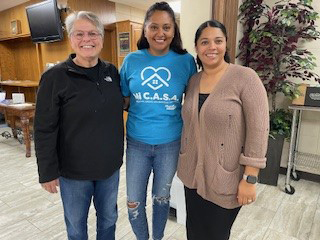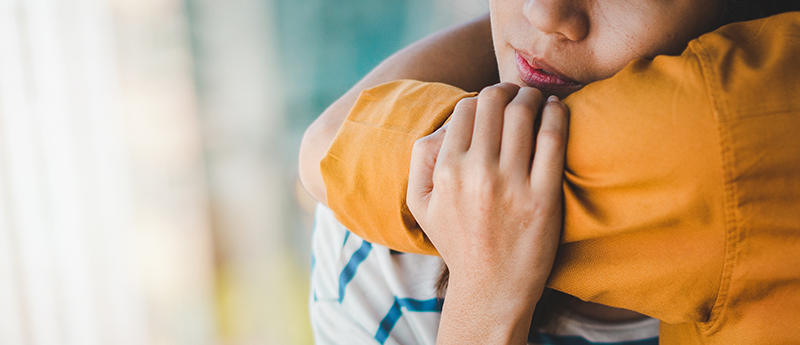Health Equity Division Newsletter - December 2024

In this newsletter:
Greetings from the Health Equity Strategy and Innovation Division
CONNECT: MDH equity advisory council now recognized in state law
STRENGTHEN: Capacity strengthening grants help community organizations grow
AMPLIFY: Understanding the connection between mental health and incarceration
Closing message from the Health Equity Division
Greetings from the Health Equity Strategy and Innovation Division
As we enter the final days of 2024, we’ve been reflecting on the successes, challenges, growth, and evolution within our teams over the past year. We adopted a new name as we grew into a division and welcomed new team members and leaders, including Division Director Odi Akosionu-DeSouza and Policy and Systems Change Supervisor Blaire Rodenbiker. We’ve started new grants, some of which are described below, while continuing to support existing ones, and we’ve honed and expanded our policy and systems change work within our division and across the department. Much of our COVID-19 work has wrapped up or evolved into long-term community recovery, and we’ve strengthened a new health equity strategist model in partnership with leaders and divisions across the agency. And this, of course, represents just a few of the ways we continue to grow and evolve in our journey to advance health equity.
As we look ahead to 2025, we are eager to share that we’ll be welcoming the robust and dynamic Minnesota Health Equity Networks team to our division! As part of several structural changes within the Minnesota Department of Health (MDH), this shift will bring the Health Equity Networks regional and relational expertise to the growing and evolving work of our division. Be sure to tune in to the newsletter in 2025 to learn more about this new partnership.
In the meantime, happy reading, and we are wishing you all a peaceful holiday season and a happy new year!
[Interested in being a guest writer for a future newsletter? Email your idea to health.equity@state.mn.us and we will be in touch!]
CONNECT
We are a network hub – leading, connecting and strengthening networks of health equity leaders and partners across MDH and Minnesota communities.

MDH equity advisory council now recognized in state law
Created in 2018 to amplify community voices and perspectives in MDH’s strategic and policy initiatives, the MDH Health Equity Advisory and Leadership (HEAL) Council was formally recognized in state statute last year (Minnesota Statute § 145.987). The current council, appointed in 2023, is the first iteration of the council since formal recognition of this essential advisory group in statute.
Codifying the HEAL Council in statute brings formal recognition to the critical role the group plays in supporting and holding MDH accountable for advancing health equity. Its inclusion in state law also helps insulate the council from political changes and ensure the sustainability of its efforts, especially considering that the work of advancing equity is better measured in years rather than days or months.
As councilmember Monica Ibarra shared, “Barriers are slowly being pried apart and dismantled, but this takes time. It can’t happen overnight. [We must] take baby steps. Policy has tentacles and deep roots.”
Over the past year, the new 18-member council has focused on building a strong foundation to support its mission of advising, monitoring, and enhancing MDH’s equity initiatives. This foundational work included establishing internal governance, refining its role within MDH, and identifying barriers to its effectiveness. The group also discussed and provided input into several of the agency’s equity priorities, including the new three-year strategic plan (PDF).
In the next year, the council aims to increase recognition of their role within MDH to foster more collaboration across program, to continue to align the council’s efforts with MDH’s equity performance metrics, and to partner with MDH leadership to craft a strategic and sustainable approach to addressing equity challenges.
After all, while MDH has made progress toward its equity goals in recent years, disparities in health and health outcomes remain pressing issues. By mobilizing resources, refining strategies, and strengthening partnerships with communities, MDH and the council are committed to driving systemic change and advancing health equity for all Minnesotans.
Learn more about the council, including meeting information its current membership, on the HEAL Council webpage.
STRENGTHEN
We provide leadership in advancing health equity and cultivate health equity leaders within MDH and across Minnesota communities.

MDH Grant Manager Amy Michael poses for a picture with Mary Hernandez and Astrid Castaneda of Mi CASA, a Capacity Strengthening Initiative grantee.
New capacity strengthening grants help community partner organizations grow
Thanks to new legislation in Minnesota, the Health Equity Strategy and Innovation Division launched a new grant program this year to help community-based organizations be better equipped to procure grants and contracts at the department and address inequities in their communities. The Capacity Strengthening Initiative grants focus on community and faith-based organizations that serve those most impacted by health inequities in the state, including people of color, American Indians, LGBTQIA+ communities, and people with disabilities.
“It’s not very often that you see funding that goes toward building capacity,” shared Amy Michael, one of the grant managers for the program in the Health Equity Division. “From my experience, I usually see a specific health issue that the grant funding is going toward. This is not focused on their programming directly. It’s really about strengthening their organization and learning about nonprofit management so that they can be successful writing grants in the future.”
The flood of applications MDH received for this program demonstrates the tremendous need for strengthening the capacity of community and faith-based organizations who are critical partners in addressing health inequities across Minnesota communities. Although the Minnesota legislature allocated less than $2 million for the grants, the department received 300 applications requesting a total of $27 million.
Ultimately, a competitive review process identified 21 top applicants who were selected for funding. The grant cycle runs through June 30, 2024.
“The Capacity Strengthening Grant has been instrumental to help us structure [our] policies and practices, and it enabled us to develop a strategic plan,” shared Mary Hernandez, executive director of Mi CASA, a grantee organization dedicated to providing culturally tailored support services for immigrant Latino families in Scott and Carver counties. “The best thing has been MDH’s flexibility and support. We were very hesitant at first to apply for the grant and have been told not to apply for state grants because there is a stigma, and we probably wouldn’t get it. But we did and we are very happy to do this work, especially the [governing] board work.”
Planting People Growing Justice Leadership Institute, another grantee, is using their funding to build internal capacity to evaluate their work and impact as an organization. The organization’s mission is to plant seeds of social change through education, training and community outreach.
“We are now measuring impact and can assess the effectiveness of our programs,” shared Executive Director and Founder Dr. Artika Tyner.
Michael and her fellow grant manager, Liz Mago, provide support to the grantees on a daily basis, helping grantees navigate the complexities of the state grant funding process. Saurav Dahal, the community collaboration and capacity building supervisor for the Health Equity Division, explained that the team conducted a pre-assessment and will be conducting a post-assessment of grantee’s capacity to measure the impact the grant has had.
“It’s seed funding or catalyst funding, that’s how I view it,” shared Dahal. “The program is brief, but our goal is to provide our community partners with a strong foundation through funding and technical assistance. We are thrilled that organizations are building critical capacity to drive meaningful impact in their communities.”
Learn more about the program on the Capacity Strengthening Initiative webpage.
AMPLIFY
We amplify the work of communities most impacted by health inequities and support them to drive their own solutions.

Learning from community: Understanding the connection between mental health and incarceration
by the Incarceration and Health Work Group, MDH Health Promotion and Chronic Disease Division
Recently, Kevin Reese (from Until We Are All Free) and Antonio Williams (from T.O.N.E. U.P. Inc) facilitated a two-part workshop for MDH staff and partners with the goal of highlighting the connections between incarceration, mental health, and community wellness. Hosted by the MDH Health Promotion and Chronic Disease Division’s (HPCD) Incarceration and Health Work Group, the two workshops focused on the unique health challenges and barriers to wellness encountered by individuals who have experienced incarceration.
Both workshops provided a platform for the voices of justice-impacted individuals to be heard, fostering powerful engagements and meaningful connections. Reese and Williams are known for an honest, powerful, and thoughtful style of presenting facts about incarceration that encourages listeners to act.
The second workshop in the series had several notable attendees including MDH Commissioner Dr. Brooke Cunningham and several department division directors. Commissioner Cunningham shared at the event that both she and MDH are committed to improving the health of all Minnesotans, and that includes people experiencing harm from the justice system.
The attendees appreciated hearing personal stories of how incarceration impacts people alongside the data, and they walked away with ideas for how they can work to improve the lives of justice-impacted individuals. The Incarceration and Health Work Group members are thankful to have heard from Reese and Williams on how the state can do better to support justice impacted individuals.
This workshop was just the first step in creating ongoing relationships with people with lived experience with health inequities, and there is a lot more work to be done. MDH is committed to continuing to listen to the people impacted by incarceration and co-create solutions to advance real change for them.
Closing message
As we close our final newsletter of 2024, we want to thank all of our colleagues and partners for your steadfast commitment to improving the health of all Minnesotans. This year brought many changes, challenges, and opportunities for us in the Health Equity Division, and we couldn’t have faced them without the strength, creativity, and resilience of the community of activists and allies that sustains us in this work. We look forward to another year of good trouble* with you all in 2025!
*Thanks to legendary civil rights leader John Lewis for the phrase from his speech atop the Edmund Pettus Bridge in Selma, Alabama, on March 1, 2020: “Get in good trouble, necessary trouble, and help redeem the soul of America.”